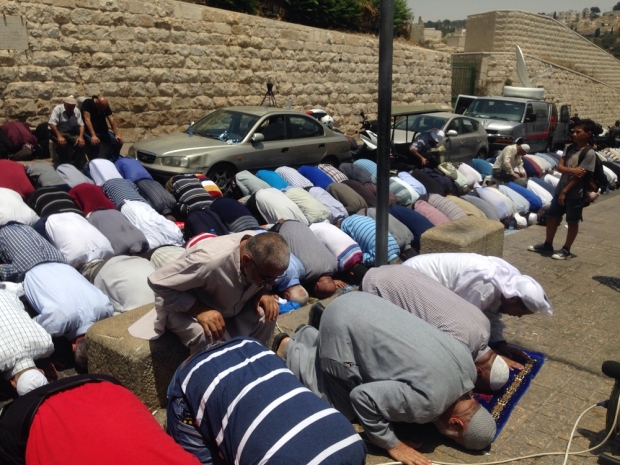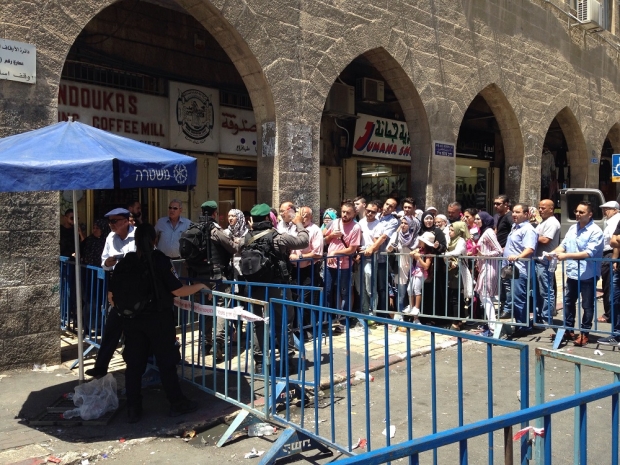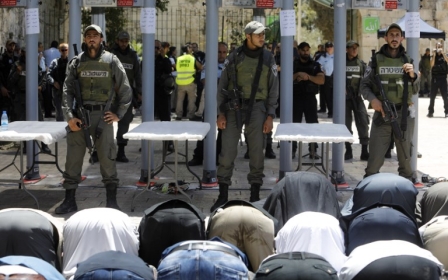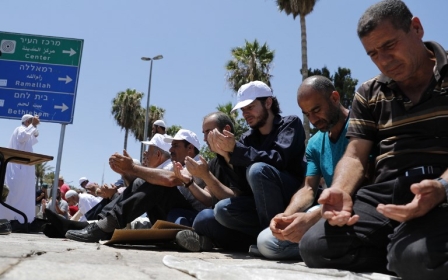Al-Aqsa officials call for protests against new Israeli checkpoints
Religious officials in charge of the al-Aqsa site in Jerusalem have called on Palestinians to protest against extra Israeli security measures, as police continued to man checkpoints around the mosque four days after a gun attack that left five people dead.
Although the complete closure of the Old City and al-Aqsa was lifted, most of the gates to the mosque remain closed.
Without removal of the security measures, there will be a big explosion in the area
- Firas Dibs, Waqf official
Those that are open have been fitted with metal detectors by the Israeli authorities, in a move rejected by the Waqf, the Islamic trust that controls the site, along with most Palestinians.
The Waqf issued a statement on Monday calling on Palestinians, "to reject and boycott all the Israeli aggression measures, including changing the historical status quo including imposing the metal detectors.”
Firas Dibs, a spokesman for Waqf, said: "Without removal of the security measures, there will be a big explosion in the area.
"The mosque is a place for praying, not for searching and abusing. These gates are imposing a new reality and it was not agreed with us.
"We will continue to protest, and we will not accept. All the religious bodies are in agreement - we will not accept these new measures."
The head of the Waqf is in touch with Jordan, which oversees the compound, to find a political situation, Dibs said.
The visit of Ariel Sharon, a former general who later became prime minister, in September 2000 led to protests that sparked the Second Intifada.
Israel has denied that the new security measures it has put in place at the entrances to the mosque amount to a change in this status quo.
The al-Aqsa mosque is the third holiest site in Islam, and is known by Israelis as the Temple Mount, the holiest site in Judaism.
We don't need permission to enter our holy places, it's not acceptable and we will not accept it
- Mohammed, shopkeeper
Jews consider the site to be the holiest in their religion. Under an arrangement agreed after Israel occupied East Jerusalem in 1967, the Waqf retains control of the site, but Israel controls access. Jews are allowed to visit, but not pray at the site.
Prayer times have seen demonstrations outside Lions' Gate, where Friday's attack took place. At a protest on Monday, speakers called on worshippers not to enter the mosque while the new security checks were in place.
Police arrested at least one Palestinian as they broke up the protest after prayers were held in the streets. On Sunday night, the Red Crescent reported that nine Palestinians had been injured when Israeli forces broke up a protest at the same spot.
"We don't need permission to enter our holy places, it's not acceptable and we will not accept it. These new security measures will lead to an explosion," Mohammed, a shopkeeper near Lions' Gate, told Middle East Eye.
"They cannot control a whole people by checkpoints. If we accept the gates today, tomorrow they will close the old city - it gives them permission to change the situation."
He said that Palestinians in the Old City were paying the price of the tension, but that when it came to al-Aqsa, their businesses didn't matter. "People are very tired of the heavy presence of soldiers in the city - I can't live with the instability."
Ehab Jallad, a Palestinian activist from Jerusalem, said that the appearance of the city was now very sad. "The gates to the mosque that are usually filled with people, shopping and going to pray, are now closed and empty. It's shocking to see the city this way."
The closure of the Old City was unprecedented, with Palestinians saying that it had not been done before. Checkpoints outside the walls were manned by soldiers who were letting in only Palestinian residents of the Old City, Jews and tourists.
Jallad said that he believed what had happened since was collective punishment. "Israel is imposing a new reality based on the actions of three individuals. It's part of them trying to unify Jerusalem."
Jallad also said that it would be a mistake to accept the metal detectors. "This is the time to resist this. If we are not patient in this demonstration then the status quo will be changed.
"We must not obey the metal detectors. Israel is using what happened on Friday to impose control on al-Aqsa and to divide it."
New MEE newsletter: Jerusalem Dispatch
Sign up to get the latest insights and analysis on Israel-Palestine, alongside Turkey Unpacked and other MEE newsletters
Middle East Eye delivers independent and unrivalled coverage and analysis of the Middle East, North Africa and beyond. To learn more about republishing this content and the associated fees, please fill out this form. More about MEE can be found here.






